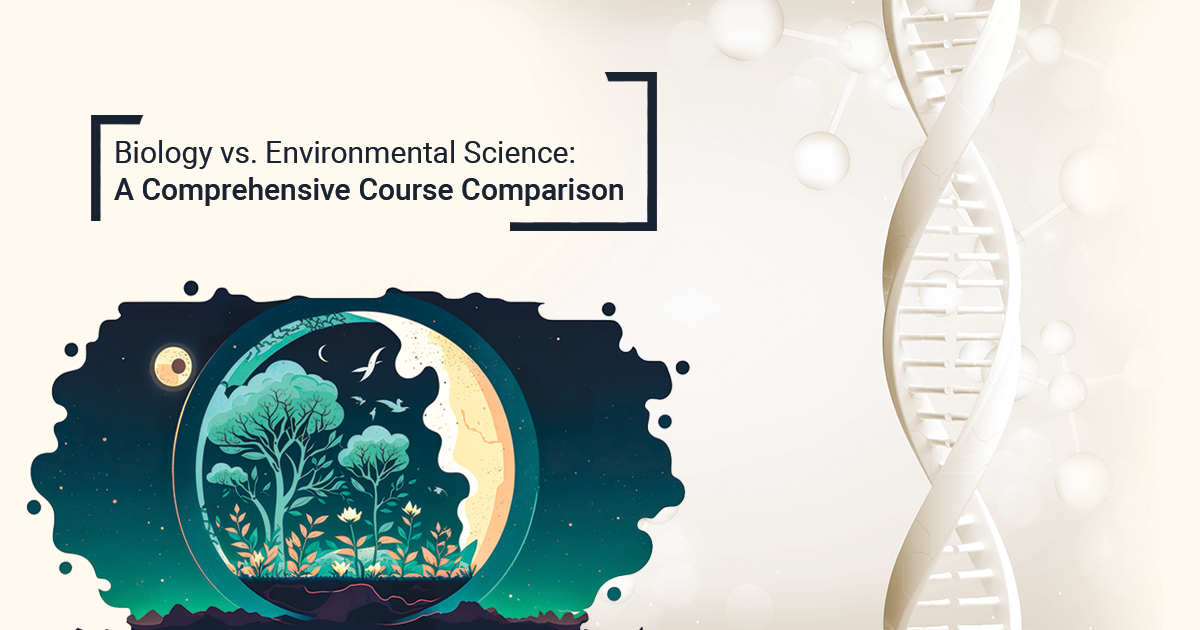Blog Detail


Biology vs. Environmental Science: A Comprehensive Course Comparison
14-10-2024

Biology is a stream and sub-field in the vast spectrum of science. Biology can be classified into sub-strata depending on the field of study and there are quite a few. However, the major two streams that fall under Biology are Botany and Zoology, the study of plants, and the study of animals respectively. The subject of Biology explores more about the function, growth, evolution, and distribution of living organisms, and more.
Bachelor in Environmental Science primarily focuses on the study of the physical, biological, and chemical nature of the environment. The field closely examines and researches the impact created by humans on the environment. The subject explores the aspects of climate change, environmental changes, disaster management and its imprints, natural resource management, and more.
Biology vs. Environmental Science: Course Duration and Eligibility
Both the courses of B.Sc Biology and B.Sc Environmental Science have been designed for 3 years (6 semesters). These three years are inclusive of theoretical and practical subject coaching and assessments.
Eligibility criteria for B.Sc Biology:
12th Grade Science Stream or equivalent studies completed with a percentage falling under the cut-offs as listed by the University.
Eligibility criteria for B.Sc Environmental Science:
12th Grade Science Stream or equivalent studies completed with a percentage falling under the cut-offs as listed by the University.
Biology vs. Environmental Science: Course Curriculum
The core subjects that come under Biology are as follows:
- Botany
- Zoology
- Microbiology
- Ecology
- Molecular Biology
- Genetics
Below listed are the core subjects that come under the course of B.Sc Environmental Science:
- Ecosystem dynamics
- Environmental education
- Environmental Management
- Biodiversity components
- Climate change
- Disaster Management
- Environmental pollution
- Natural resource
- Resource conservation
Biology vs. Environmental Science: Career Opportunities
Biology and Environmental Science are affiliated with multiple career options and below listed are some options to consider.
Career possibilities after Pursuing Biology
- Biotechnologist: Researches and carries out experiments on improving the products used for agriculture and medicines
- Microbiologist: Studies and research on the growth of microscopic organisms and their living conditions
- Geneticist: Specialises in the study of genes and their varying effects
- Botanist: Studies and researches further on plant functioning and systems
- Zoologist: Studies and researches further on animal functioning and systems
- Ecologist: Studies the relationship between plants, animals, and environments and curates appropriate strategies for the better functioning of the environmental world
- Pharmacologist: Works with medical scientists to create new drugs
Career Possibilities after Pursuing Environmental Science
- Environmental Scientist: Carries research and studies to foster environmental health.
- Environmental Consultant: Engages in collecting data and analysing the pollution levels and ideates appropriate strategies to fight the same
- Sustainability Officer: Works as an executive responsible for practising and promoting sustainability practices within the company
- Ecologist: Studies the relationship between plants, animals, and environments and curates appropriate strategies for the better functioning of the environmental world
- Environmental Engineer: Works on developing solutions by taking planetary health into consideration
- Urban and Regional Planner: Involves in planning and designing housing projects and city planning to accommodate the population by considering the environmental health and its sustenance
- Environmental Lawyer: Compiles evidence and drafts strategies to foster environmental health and promote sustainable practices
- Renewable Energy Specialists: Involves ideates and curates sustainable environmental practices for organisations after understanding the evolving technologies and their negative implications for the world
In Short
The fields of Biology and Environmental Science are two closely related yet diverse fields and are inclusive of various subdivisions. These courses are the absolutely right pick for students who are environment enthusiasts and love to study the details of cell life and the in-depth functioning of its entire existence. Students can choose from a range of multiple career opportunities available based on their interests and career goals.